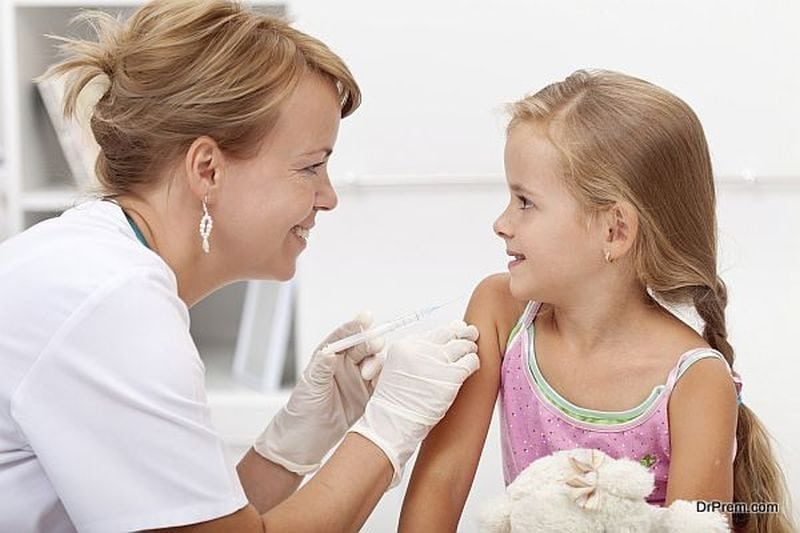As parents, it’s your job to keep your children healthy and safe. This includes educating them about certain dangers, fueling their body with healthy, nutritious foods, and making sure they receive proper medical care. A child’s development is rapid and amazing. Kids learn and grow so much in their first few years of life, but they’re also vulnerable and susceptible to certain illnesses and conditions. That’s the reason why visiting your pediatrician for annual wellness checks is so important. But what exactly are they looking for in terms of milestones and medical concerns? And what vaccinations and tests do most children receive? Find out below.
When to Go

During the first few months of your child’s life you may feel like you’re living at your pediatrician’s office. That’s because infants see their pediatrician every few months during their first year of life. During the first few weeks, you’ll see your doctor a few times. This is to ensure that your baby returns to their birth weight shortly after delivery. Most infants lose around 5% of their body weight following birth and are expected to return to their birth weight by 2 weeks of life. During these first initial visits, the pediatrician will also check your baby’s skin tone, reflexes, feeding habits, and alertness.
Here is a basic outline of when your child should see the doctor.
- 1 month
- 2 months
- 4 months
- 6 months
- 9 months
- 12 months (1 year)
- 15 months
- 18 months
- 24 months (2 years)
- 30 months
- 36 months (3 years)
- Annually
Of course, if you believe your child is experiencing any medical complications or developmental issues, it’s recommended you schedule a visit with your child’s doctor.
Height and Weight
These are basic growth measurements taken at all doctor’s visits. This is true even for adults. Monitoring a child’s height and weight is especially important because it helps determine where they fall on the growth chart. A growth chart provides the national average and guidelines for how a child should be developing by a certain age. At your child’s visit, the doctor will tell you what percentile your child falls into for height and weight. This figure indicates where your child is in relation to other children his/her age. Monitoring this number helps the doctor determine if you need to make any adjustments in your child’s diet or activity level. They can also provide a very loose estimate of your child’s height upon entering adulthood.
Vaccinations
 There are certain vaccinations that most children are required to get. Vaccinations are used to help build a child’s immune system up against specific diseases. Some people do not believe in vaccinations for their child for religious or other reasons. Vaccinations are a parent’s choice but many schools require them for attendance unless a medical or religious note is provided.
There are certain vaccinations that most children are required to get. Vaccinations are used to help build a child’s immune system up against specific diseases. Some people do not believe in vaccinations for their child for religious or other reasons. Vaccinations are a parent’s choice but many schools require them for attendance unless a medical or religious note is provided.
For those parents that allow vaccinations, here is a breakdown of the basic ones your child will receive.
- Chickenpox (varicella)
- Hepatitis A and B
- Hib
- Human papillomavirus (HPV)
- Diphtheria, tetanus, and pertussis (DTap)
- Polio (IPV)
- Influenza
- Measles, mumps, and rubella (MMR)
- Meningococcal
- Rotavirus
- Pneumococcal (PCV)
Like with any new substance introduced into your baby’s system, reactions are possible. If you have any questions or concerns about how your baby might react or be affected by the above mentioned vaccines, discuss this before they are administered the dose. It’s important you are educated and feel comfortable with all vaccines given to your child.
Eyes and Ears
Your child’s doctor will also check their eyes and ears for any issues. Eye exams at a young age are relatively basic and include having your child cover one eye at a time and read either letters or identify shapes from a certain distance. This method of testing will help the doctor determine if further eye exams are needed. If the pediatrician thinks your child may need glasses, they will likely offer help finding an eye doctor who can perform a more thorough exam. Hearing tests are also routinely done at your child’s well visit. The doctor will either place small earbuds into your child’s ear or use headphones. They will then use a machine to play different sounds of various pitches and volumes, asking your child to raise the designated hand when they hear the tone in that ear. If your child appears to have complications with their hearing, the pediatrician may recommend you see an ENT (ear, nose, and throat specialist).
Developmental Checks

These checks are done at every well visit your child will have. Most developmental checks and diagnosis are made based on the doctor’s conversation with you, the parent, and your child when they’re old enough to respond. The doctor will ask if your child is performing specific tasks based on their age and expected milestones. These things can range from if your child is rolling over and reaching for objects as an infant to whether or not they can balance on one foot, button their coat, or read. Just like with your child’s growth progression, these milestones are loose guidelines for development. All children progress at a different pace. Some children will walk before others and become toilet trained at a young age, while others may take longer to master these skills. As long as you keep open lines of communication with your doctor, you can work together to offer your child the support and help they need to reach their goals.
Physical Exam
Your child will also receive a full physical exam. Literally, from head to toe! Most doctors will have your child wear nothing but their underwear and perhaps a pair of socks. This allows them to easily examine all of your child’s extremities and other important areas. When your child is an infant until about the age of 18 months, the doctor will examine their skull carefully to check for soft spots. The doctor will also check the following areas at all visits:
- Ears
- Eyes
- Nose
- Mouth/Throat
- Spine
- Extremities
- Abdomen
- Genitals
If there’s a specific area of your child’s body you have a question about or would like the doctor to examine more closely, don’t be afraid to speak up. As the parent, you know your child best and see them in close proximity every day. The doctor values your insight and opinion as well.
The Later Years
Once your child is above the age of three, your doctor will only see them annually for well visits or when your child is sick or you have a specific concern. It’s also recommended that any child under the age of 5 receives a flu shot. But just like vaccinations, this is often a parent’s choice. When your child enters school and begins playing sports, a routine physical exam may be required by the coach or league. Many of your child’s physical and cognitive milestones will occur in the early years and are closely monitored by your pediatrician. But if at any point you have a question or concern, call your child’s doctor immediately. If they can’t assist you, they will recommend the right person for the job!
Article Submitted By Community Writer




